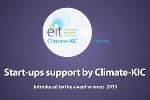Biogas, Energising the Countryside (ETC)
Challenge Platform: Bio-Economy
Project Start Date: 01/2013
Lead partner: Utrecht Sustainability Institute (USI), University of Utrecht, NL
Project type: Innovation – Develops and brings to market climate-relevant knowledge, products and services
Project lead: Sander de Vries, University of Utrecht
Partners
This project involves 8 partners in 4 European countries:
- Universiteit Utrecht, Utrecht Sustainability Institute (USI), The Netherlands (Climate-KIC Core Partner)
- Cornelissen Consulting B.V. (CCS), The Netherlands
- Imperial College London (ISL), UK, (Climate-KIC Core Partner)
- Fraunhofer IWES (IWES), Germany
- GDF SUEZ, France, (Climate-KIC Core Partner)
- Netherlands Organisation for Applied Scientific Research (TNO), The Netherlands, (Climate-KIC Core Partner)
- Province of Utrecht (PoU), The Netherlands
- Wageningen University and Research Centre (WUR), The Netherlands (Climate-KIC Core Partner)
Concept
Turning agricultural waste gases into a useful resource such as biogas is a good way to reduce greenhouse gas emissions. Biogas, Energising the Countryside (ETC) intends to make this economically viable at remote locations and for small-scale producers. The project develops a low-cost small-scale gas conversion device to be installed on farms. In the long-run Biogas ETC aims to accelerate Europe’s transition towards a decentralized supply of sustainable energy.
The climate change issue
A major source of greenhouse gases is livestock manure. CH4 (methane), the main constituent of biogas, is a particularly potent greenhouse gas so burning biogas as fuel has the dual benefits of avoiding methane emissions and avoiding the burning of gas from non-sustainable sources. However, the biogas conversion process is under-utilised due to the fact that part of the products can only be sold locally, and local demand is not always there. For small and remote farms, this means that investment in biogas conversion is simply not economically viable.
The Project Solution
Biogas ETC aims to make the transformation of agricultural waste into biogas economically viable on a small scale, allowing farmers in remote locations to create and market biogas, increase their income and reduce their greenhouse gas emissions. This will be achieved by developing a small-scale gas upgrading system with relatively low running costs, which can be installed on individual farms to create a high quality fuel from their waste products, suitable for transportation or injection into the gas grid. The system could be made available to smaller and less profitable farms on a rental basis to reduce investment risk. The biomethane provided by this system can be used as a replacement for natural gas, or as a transport fuel, which both command a higher market price than the heat and electricity traditionally created by biogas, meaning that the farmers will see a higher return on investment.
Additionally, biomethane is always in demand and can be transported and marketed anywhere, while heat can only be utilised locally, if at all. The project will also help farmers identify market strategies and potential risks, creating a business plan so that they can market their products effectively, increasing their profits while reducing their emissions.
The role of Climate-KIC
Climate-KIC provided Biogas ETC with vital funding to their project, as well as access to a network of valuable partners who helped to improve the efficiency and effectiveness of the project.



